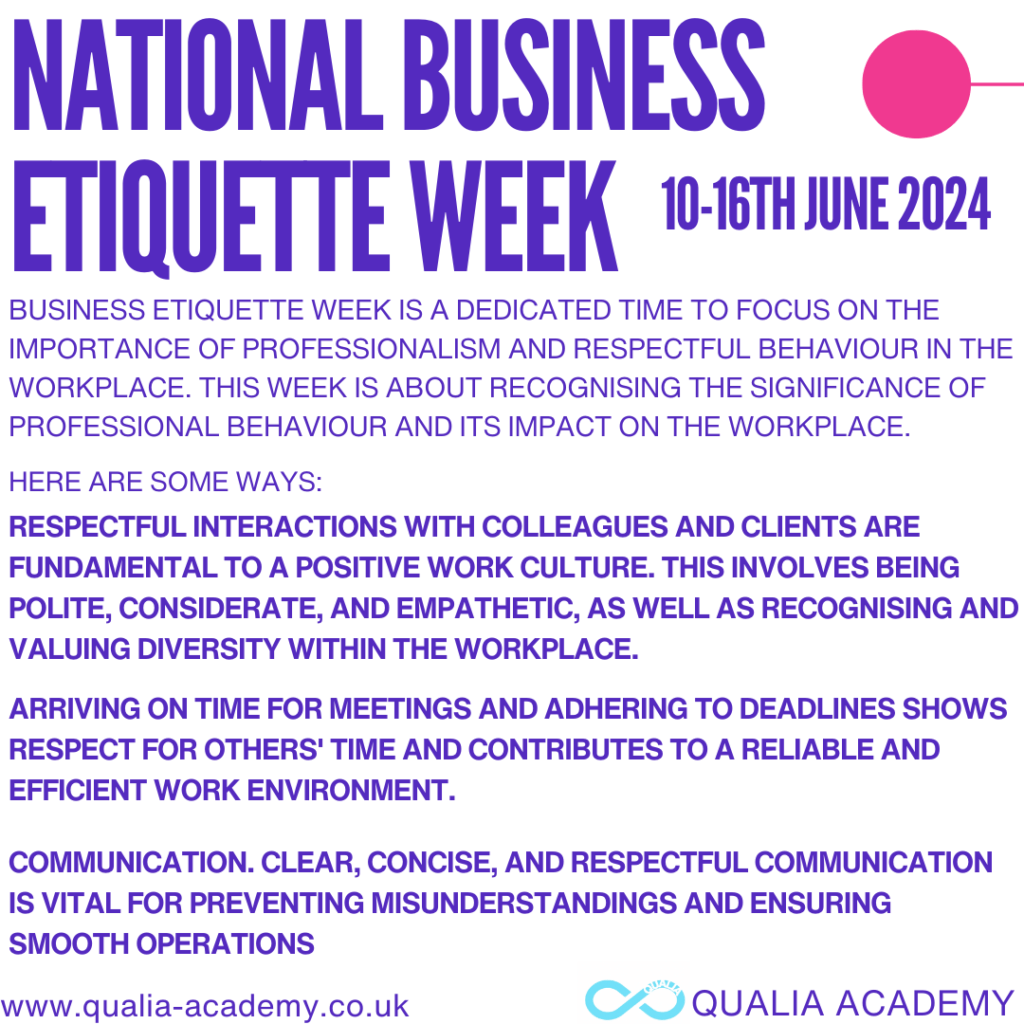In today’s globalised and interconnected world, the significance of business etiquette cannot be overstated. It serves as a cornerstone of professional interactions, helping to foster respect, build relationships, and enhance the overall business environment. National Business Etiquette Week, celebrated annually during the second week of June, provides a prime opportunity to reflect on the importance of etiquette in the business realm and to promote best practices within organisations.

What is Business Etiquette?
Business etiquette refers to the set of conventional rules and behaviours that are expected in professional settings. These norms govern interactions among colleagues, clients, and other stakeholders, ensuring that communication and conduct are respectful and appropriate. Business etiquette encompasses a wide range of behaviours, including but not limited to:
Communication: Politeness in verbal and written communication, active listening, and appropriate use of language and tone.
Appearance: Dressing appropriately for the workplace or professional events.
Punctuality: Valuing time by being prompt for meetings and deadlines.
Networking: Engaging in professional social interactions with courtesy and respect.
Digital Etiquette: Conducting oneself properly in virtual communications, including emails and video conferences.
The Importance of Business Etiquette
Building Professional Relationships: Etiquette fosters mutual respect and understanding, which are crucial for building and maintaining professional relationships. When individuals adhere to etiquette norms, it signals respect for others’ time, space, and contributions.
Creating a Positive Work Environment: A workplace characterised by good etiquette is often more harmonious and productive. Employees are more likely to feel valued and respected, which can lead to increased morale and job satisfaction.
Enhancing Company Reputation: Businesses that emphasise etiquette in their operations are likely to be perceived more positively by clients, partners, and the broader community. This can lead to better business opportunities and a stronger brand reputation.
Improving Communication: Clear and respectful communication is a cornerstone of effective business operations. Etiquette ensures that interactions are conducted smoothly and misunderstandings are minimised.
Facilitating International Business: In an increasingly global marketplace, understanding and respecting cultural differences in business etiquette is crucial. This awareness can help prevent cultural missteps and build stronger international partnerships.
How Businesses Can Implement Business Etiquette
Training and Education: One of the most effective ways to instill business etiquette is through training programs. Regular workshops and seminars can help employees understand the importance of etiquette and how to apply it in various scenarios. Topics might include communication skills, cultural sensitivity, and digital etiquette.
Leading by Example: Leadership plays a pivotal role in setting the tone for business etiquette. When leaders model respectful and professional behaviour, it sets a standard for the rest of the organisation to follow. This can be reinforced through consistent practices and policies.
Clear Policies and Guidelines: Establishing clear guidelines on expected behaviours can help employees understand what is required of them. This might include dress codes, communication protocols, and guidelines for meeting conduct. These policies should be communicated clearly and reinforced regularly.
Feedback Mechanisms: Providing opportunities for feedback can help organisations continuously improve their etiquette standards. This might involve regular surveys, suggestion boxes, or open forums where employees can share their thoughts on workplace conduct and suggest improvements.
Cultural Sensitivity Training: Given the diverse nature of the modern workplace, cultural sensitivity training is essential. This helps employees understand and respect different cultural norms and practices, which is particularly important for businesses with international dealings.
Recognising and Rewarding Good Etiquette: Positive reinforcement can be a powerful tool for encouraging good etiquette. Recognising and rewarding employees who consistently demonstrate high standards of professionalism can motivate others to follow suit.
Challenges in Maintaining Business Etiquette
While the benefits of good business etiquette are clear, maintaining high standards can be challenging. Some common obstacles include:
Cultural Differences: Navigating the complexities of cultural norms can be difficult, especially in multinational organisations. What is considered polite in one culture may be perceived differently in another.
Here are solutions to this:
Training and Awareness: Implement comprehensive cultural competency training programs to educate employees about the diverse cultural norms and expectations. This can include workshops, online courses, and interactive sessions that highlight the importance of understanding and respecting cultural differences.
Diverse Teams: Encourage the formation of diverse teams to promote cross-cultural understanding and collaboration. This can foster an environment where employees learn from each other’s cultural perspectives.
Cultural Ambassadors: Appoint cultural ambassadors within the organisation who can provide insights and guidance on cultural matters. These ambassadors can serve as a resource for employees needing advice on cultural etiquette.
Generational Gaps: Different generations often have varying expectations and norms regarding etiquette. Bridging these gaps requires understanding and compromise.
Here are some solutions to this:
Mentorship Programs: Establish mentorship programs that pair younger employees with more experienced ones. This encourages the sharing of knowledge and helps bridge generational divides.
Open Dialogue: Foster an environment of open dialogue where employees from different generations can discuss their expectations and preferences. This can be facilitated through regular team meetings, focus groups, and feedback sessions.
Flexible Policies: Develop flexible workplace policies that accommodate the needs and preferences of different generations. For example, offering various communication channels (email, instant messaging, face-to-face meetings) allows employees to choose the mode that works best for them.
Digital Communication: The rise of digital communication presents new challenges for etiquette. Miscommunications can occur easily through email or messaging platforms, and maintaining professionalism in virtual meetings requires additional effort.
Here are some solutions for this:
Training Programs: Conduct training sessions focused on digital etiquette, covering topics such as email decorum, appropriate use of messaging platforms, and video conferencing best practices.
Clear Guidelines: Develop and distribute clear guidelines on digital communication. This should include expectations for response times, appropriate language and tone, and the use of video conferencing tools.
Monitoring and Feedback: Implement a system for monitoring digital communication and providing feedback. This can help identify areas for improvement and ensure that employees adhere to digital etiquette standards.
Changing Work Environments: The shift towards remote and hybrid work models has altered traditional workplace dynamics. Ensuring that etiquette standards are upheld in these new environments requires adaptability and ongoing attention.
Here is how:
Remote Work Policies: Develop specific etiquette policies for remote work, including guidelines for virtual meetings, email communication, and digital collaboration. Ensure that these policies are communicated clearly to all employees.
Regular Check-Ins: Schedule regular check-ins with remote and hybrid employees to address any concerns or challenges they may face regarding business etiquette. This also helps maintain a sense of connection and inclusion.
Technology Training: Provide training on the use of digital tools and platforms to ensure that all employees can effectively navigate remote work environments. This includes training on video conferencing etiquette, managing virtual meetings, and using collaboration software.









